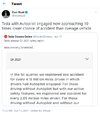Elon recently celebrated Autopilot’s accident record claiming it had a nearly 10 times lower chance of having an accident.

Tesla Vehicle Safety Report
So, is Autopilot better than a human in Great Britain?
In 2019:
Now if we just look at Motorways (the current intended use case for Autopilot):
I don’t think we need to start protesting to ban human drivers just yet.
Tesla’s methodology doesn’t look at minor accidents. As a comparison there are about 2.1m motor claims in the UK each year = One per 13,000 or so miles. The 117k figure is accidents recorded by the police. The long and short of it because Tesla doesn’t produce their own regional breakdown it’s hard to say. Depending on how you cut the accident data you can make the numbers say what you like. I would suggest that perhaps the NHTSA comparison is not a fair one.
Interestingly, it does seem the UK is much safer place to drive than the USA generally though.

International comparisons of road accidents (RAS52)

Tesla Vehicle Safety Report
So, is Autopilot better than a human in Great Britain?
In 2019:
- 356.5 Billion Vehicle Miles for all motor vehicles [Road traffic statistics - Summary statistics, Vehicle Miles Driven, All Motor Vehicles]
- 117,536 accidents [Reported road accidents (RAS10)]
Now if we just look at Motorways (the current intended use case for Autopilot):
- 70.5 Billion Vehicle Miles
- 4,130 accidents
I don’t think we need to start protesting to ban human drivers just yet.
Tesla’s methodology doesn’t look at minor accidents. As a comparison there are about 2.1m motor claims in the UK each year = One per 13,000 or so miles. The 117k figure is accidents recorded by the police. The long and short of it because Tesla doesn’t produce their own regional breakdown it’s hard to say. Depending on how you cut the accident data you can make the numbers say what you like. I would suggest that perhaps the NHTSA comparison is not a fair one.
Interestingly, it does seem the UK is much safer place to drive than the USA generally though.
International comparisons of road accidents (RAS52)
Last edited:


